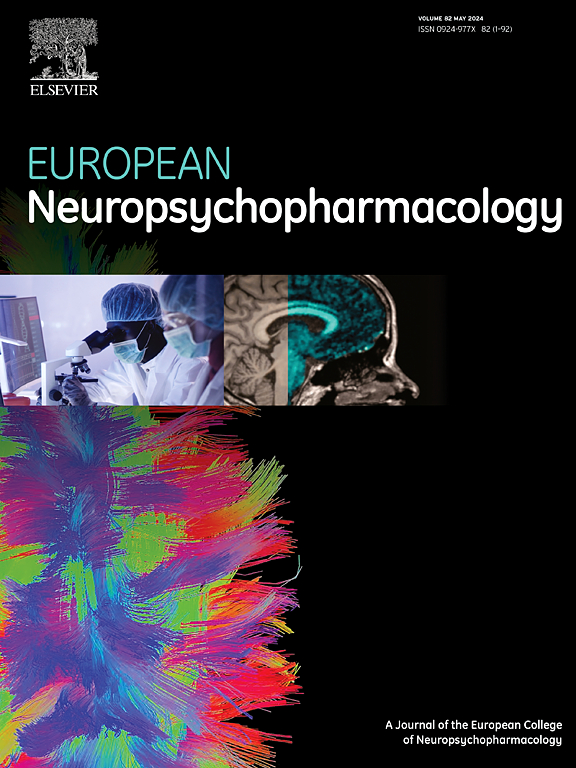THE IDENTICAL DEPRESSION PHENOTYPING CONSORTIUM: DECONSTRUCTION AND PREDICTION OF MDD AND TREATMENT RESPONSE
IF 6.1
2区 医学
Q1 CLINICAL NEUROLOGY
引用次数: 0
Abstract
The Identical Depression Phenotyping Consortium consists of studies in the UK (Genetic Links to Anxiety and Depression or GLAD and UK Biobank), the Australian Genetics of Depression study, and the Biobanks Netherlands Internet Collaboration (BIONIC). The three studies are using the same method of phenotyping depression with detailed demographics, clinical record linkage, and data on over 130,000 cases of Major Depressive Disorder. We propose a symposium focused on advancing predictive models in MDD and its treatment, emphasizing the integration of polygenic scores, family history, and clinical data.
Wang will present on Joint Multi-Family History and Multi-Polygenic Score Prediction of Major Depressive Disorder. Machine learning integrating these factors in GLAD (9,927 MDD cases, 4,452 controls) revealed significant prediction accuracies for MDD, the number of recurrent MDD episodes. These findings were replicated in UK Biobank (40,667 MDD cases, 70,755 controls). Next, Li will present on incorporating genetic and clinical predictors for antidepressant side effects in > 5K cases from the GLAD study. By employing machine learning models, they achieved significant success in predicting side effects and discontinuation rates, particularly when integrating data from prior prescriptions. Huider will present on genetic analyses of MDD on behalf of the BIONIC consortium presents a large-scale genetic analyses of MDD and its symptoms to explore depression heterogeneity within the Netherlands, utilizing uniform in-depth phenotyping in > 30K cases. This ambitious project highlights the importance of large, homogeneous datasets in deciphering the complex genetics of depression. Finally, Mitchell will present on Using polygenic risk scores to characterise treatment resistant MDD in to explore the association of TRD with biological predictors such a polygenic score (PGS) and CYP2C19 and CYP2D16 metaboliser profiles, measured personality traits, and environmental predictors such as social support and exposure to stressful life events. Lastly, they tested for any gene-environment interactions across predictors. Their research identifies genetic factors that correlate with long-term treatment outcomes, providing a basis for personalized medicine in treating depression.
This symposium aims to showcase cutting-edge research that integrates genetic, familial, and clinical data to predict and manage major depressive disorder more effectively. Discussant Hatoum will consider the implications of integration of genetic prediction with machine learning approaches and the possibilities for clinical utility.
相同抑郁表型联盟:解构和预测 MDD 及治疗反应
同种抑郁症表型研究联盟由英国的研究(焦虑和抑郁的遗传链接或 GLAD 和英国生物库)、澳大利亚抑郁症遗传学研究和荷兰生物库互联网合作(BIONIC)组成。这三项研究采用相同的方法对抑郁症进行表型分析,包括详细的人口统计学数据、临床记录链接以及超过 13 万例重度抑郁症病例的数据。我们提议召开一次专题讨论会,重点讨论 MDD 及其治疗的预测模型,强调多基因评分、家族史和临床数据的整合。在GLAD(9927例MDD病例,4452例对照)中整合了这些因素的机器学习显示,对MDD、MDD反复发作次数的预测准确率很高。这些发现在英国生物库(40667 例 MDD 病例,70755 例对照)中得到了验证。接下来,Li 将介绍在 GLAD 研究的 5K 个病例中纳入抗抑郁药物副作用的遗传和临床预测因素。通过采用机器学习模型,他们在预测副作用和停药率方面取得了巨大成功,尤其是在整合先前处方数据时。Huider将代表BIONIC联盟介绍MDD的遗传分析,该联盟利用对> 3万个病例的统一深入表型,对MDD及其症状进行了大规模遗传分析,以探索荷兰国内抑郁症的异质性。这一雄心勃勃的项目凸显了大型同质数据集在解读抑郁症复杂遗传学方面的重要性。最后,米切尔将发表题为 "使用多基因风险评分来描述耐药性MDD "的报告,探讨TRD与生物预测因素(如多基因评分(PGS)、CYP2C19和CYP2D16代谢物特征)、人格特征测量结果以及环境预测因素(如社会支持和生活压力事件)之间的关系。最后,他们测试了各种预测因素之间的基因与环境之间的相互作用。他们的研究确定了与长期治疗效果相关的遗传因素,为治疗抑郁症的个性化医疗提供了基础。本次研讨会旨在展示整合遗传、家族和临床数据的前沿研究,以便更有效地预测和管理重度抑郁障碍。讨论者 Hatoum 将探讨基因预测与机器学习方法相结合的意义以及临床应用的可能性。
本文章由计算机程序翻译,如有差异,请以英文原文为准。
求助全文
约1分钟内获得全文
求助全文
来源期刊

European Neuropsychopharmacology
医学-精神病学
CiteScore
10.30
自引率
5.40%
发文量
730
审稿时长
41 days
期刊介绍:
European Neuropsychopharmacology is the official publication of the European College of Neuropsychopharmacology (ECNP). In accordance with the mission of the College, the journal focuses on clinical and basic science contributions that advance our understanding of brain function and human behaviour and enable translation into improved treatments and enhanced public health impact in psychiatry. Recent years have been characterized by exciting advances in basic knowledge and available experimental techniques in neuroscience and genomics. However, clinical translation of these findings has not been as rapid. The journal aims to narrow this gap by promoting findings that are expected to have a major impact on both our understanding of the biological bases of mental disorders and the development and improvement of treatments, ideally paving the way for prevention and recovery.
 求助内容:
求助内容: 应助结果提醒方式:
应助结果提醒方式:


